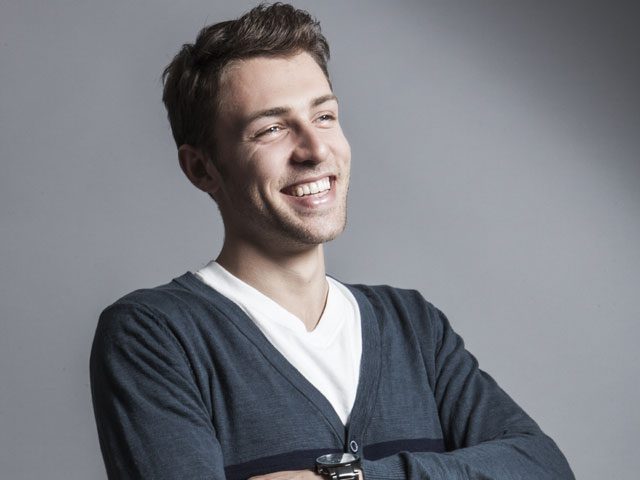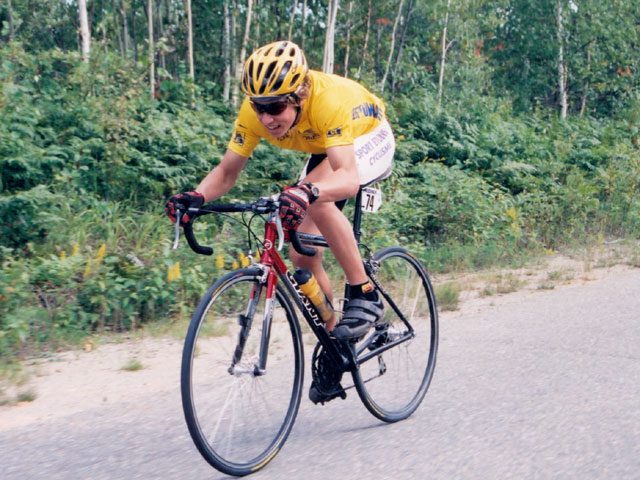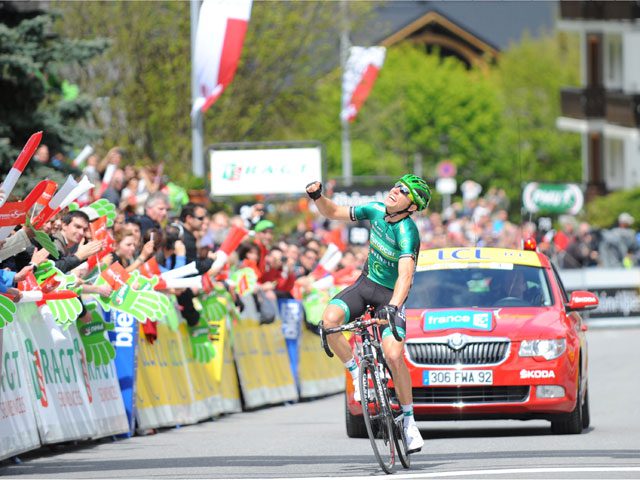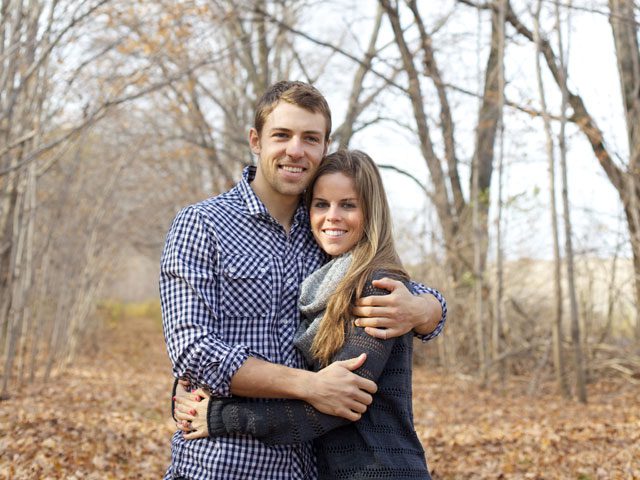David Veilleux and early retirement from the pro peloton
 Photo by:
David Cannon
Photo by:
David Cannon
In September, a few days before David Veilleux would race in the Grand Prix Cycliste de Québec, the Europcar rider from Cap-Rouge, Que., shocked the Canadian cycling community. He was retiring from professional cycling to complete his mechanical engineering degree. This announcement came at the end of Veilleux’s most successful season, which included a debut at the Tour de France and three days in the yellow jersey at the Critérium du Dauphiné. At 25 years old, he could have stayed at least 10 more years in the pro ranks and had the possibility of more successes. Veilleux, however, believes that he had reached his full potential as a professional road racer. He was looking forward to starting the next chapter of his life outside the world of cycling.
For cycling fans, the decision to leave what seems like a dream job is perplexing. But Veilleux’s longtime coach and confident Pierre Hutsebaut, former CEO and high performance director at the Canadian Cycling Association, has some insight. “I knew the time would come soon,” Hutsebaut said. “He has other goals to pursue in life. He had made the commitment and sacrifices to achieve a high level of performance in the past two years. When he had finished the Tour de France, he enjoyed the satisfaction of a job well done. It’s important for him to get a university degree, to get an engineer’s status and to live as a newly married couple with his wife.”
Although Veilleux was in the early stages of his professional career just before his retirement, he had been racing bikes for 14 years. He started mountain biking in his hometown and later discovered the high school athlete studies program, which directed him toward road racing as a junior rider. Additional guidance from his local club, Elite Cycling, got him into provincial-level racing. In 2006, he began to develop a coach/athlete relationship with Hutsebaut, someone who he relied on as a mentor during the next eight years of his career.
“He was always there and really helped me when I was younger,” Veilleux said. “Coming from France, he knows a lot about the culture of European cycling. He has learned a lot from new techniques like power output. I thought it was a good balance between the old school and the new school training. We worked a lot together during those years. He worked a lot with me when I was racing in the U.S. and gradually in Europe, too.”

Veilleux’s victory at the Tour de l’Abitibi in 2005 showed his world-class potential during his junior years. As an under-23 rider, he secured national titles in the road race and time trial. He was offered a spot on the U.S.-based team Jittery Joe’s in 2007 before making the move over to Kelly Benefit Strategies in 2008, where he gained experience racing at top-level American stage races and criteriums. For those following his career, it was no surprise when he won the Tour of Elk Grove (2008), Fitchburg Longsjo Classic (2010) and placed well in events on the USA Cycling’s National Racing Calendar.
In 2011, Veilleux got a career-changing opportunity to race with the French team Europcar, home to riders such as Thomas Voeckler, Pierre Rolland and Cyril Gautier. Some wondered if he would be able to make the jump to the European ranks so quickly, but it was clear he had made the right decision after winning the La Roue Tourangelle that spring. His success continued the following year at Paris- Roubaix where he rode into the decisive breakaway and finished 25th on the day. He also won a stage at the Mi-Août Bretonne and the semi-Classic Tre Valli Varesine in 2012.
Throughout that time, Veilleux continued to work with Hutsebaut and to show dedication to le métier. “David and I grew together from one level to another along our eight-year collaboration,” Hutsebaut said. “David is a very articulate person. He was very dedicated to training, not skipping or cutting sessions and provided precise feedback, which is essential to making adaptations. Every day, I knew what he had done via the online platform we used. David was very organized at competitions and he never complained about circumstances or opponents, and never looked for excuses if things didn’t turn out as he had anticipated. His physical qualities were matched by his mental strength and determination. Other athletes may have better physiological profiles, but he had the mental strength to push himself further year after year.”

This past summer, Veilleux secured his biggest career win when he soloed to the Stage 1 victory in Champéry, Switzerland at the Critérium du Dauphiné. He was in a decisive breakaway for much of the 121-km stage and attacked his small group with 45 km to go. He rode alone to the finish line, winning the stage nearly two minutes ahead of the field. With help from his Europcar teammates, Veilleux hung onto the yellow jersey through the next three stages.
He accomplished what so many cyclists will only ever dream of. After his success at the Dauphiné, he was selected to compete at the Tour de France, the first Quebecborn rider to do so. He had the support of the nation cheering him all the way to the Champs-Élysées. Many cyclists are involved in the sport today because they saw the Tour de France on television, perhaps a stage in the Alps or the Pyrenees, or the finale in Paris. Some of them went out and bought their first bike, others joined a club and began racing. A few of those riders made it all the way to the professional ranks with a dream of one day racing in the three-week-long Grand Tour. Veilleux’s dream came true on June 26, on the island of Corsica, on the start line of the 2013 Tour. He raced well and was able to contribute to his team Europcar’s success. He even raced into a decisive breakaway on Stage 2, which gave his fans back home a chance to root for a fellow countryman on television.
“I have a lot of great memories,” Veilleux said. “This past year, racing at the Tour de France and my performance at the Dauphiné was really nice. Last year, my win at Tre Valli was special because I wasn’t expecting that at all. Every year, I have something special that stands out. The first year with Europcar, I was in the breakaway at Paris-Roubaix and finished well, and that was a great experience. There are many things from each year that stand out as great memories for me.”
Perhaps if he had continued to race and gain more experience, he could have won a stage or two, or maybe even the whole Tour. We’ll never know. Maybe that’s what makes his decision so hard for his fans and colleagues to grasp fully. But Veilleux didn’t envision a career of Grand Tour triumphs. He believes he might have been a good Classics contender, but that wasn’t enough to keep him motivated to continue down the often arduous path of a pro cyclist.
“If I didn’t retire now, I would have focused on shorter stage races and courses like the Ardennes Classics,” Veilleux said. “I think races like Amstel Gold would have suited me better. To try to get a stage win at the Tour might have been possible for me.
“I don’t know why I chose this particular year to retire. I always kind of do a recap of my season and I take the time to think about what I have achieved and what I want to gain going forward. This year, after the Tour, it was a great year and I’m happy about that. I evaluated what I achieved, what I want to do and what my other goals in life are, too. I decided now was a good time to go back to school and finish my engineering degree.
“This might have been my best season ever, even if I had continued. Maybe I would have never achieved that again, even if I raced for another five or 10 years. I’m really happy with what I’ve achieved and I can leave the sport satisfied with how I pushed myself and with the results that I earned.”

His decision to quit wasn’t easy, but he had been pondering the idea for a long time. Getting his degree in engineering had become more of a priority. Juggling his classes at Laval University each fall with professional cycling each spring and summer had become more and more difficult. He is now two years away from graduating. He also married his high school sweetheart, Emilie Coulombe, this past summer. The demands of life on the road had a big effect on his home and personal life.
“The people who know me very well and are close to me saw this coming,” Veilleux said. “They supported me and they were happy for me. It depends on who talks about it, but most people understand and support my decision. It wasn’t an easy decision to make and they all understand.
“I’ve been doing this for more than 10 years and I’ve always travelled so much. Training in the warmer weather during the winter and also racing in the U.S. and Europe all year meant that I was away from home a lot. Being in Europe from January all the way to July was a big sacrifice for me. It was all those sacrifices that added to my decision.
“But some of these things were also parts of the sport that I really liked. To be able to see new places, new cultures and learn about new foods. I liked when I had a week between races or a week of no training and I could go visit some places in the Alps or Spain. I also liked setting goals and sticking to them. The excitement of European racing and being able to race the monuments of my sport was so much fun. I’ve had great experiences.”
Veilleux’s only regret is not making it to the 2012 London Olympic Games. He was on track after having a good season and expected to make the team. The national federation sent three riders for the road race in previous years; however, the country was only eligible to send one athlete to London. After careful consideration, they decided to go with Ryder Hesjedal for both the road race and the individual time trial.
“The Olympics is something that I really wanted to do when I was younger. I was trying to achieve that goal because I thought that racing the Tour de France was impossible for me. I wanted something that was more achievable. It turns out that we only had one place in London. That wasn’t my fault, but I do feel like I was ready for those Games. It was disappointing.
“An athlete always dreams of winning big races but there was nothing particular that I wanted to win. Maybe winning the one-day race, Grand Prix Cycliste de Québec, would have been fantastic. But races at home are the hardest to win because you think too much and want it too badly. I never really put pressure on myself to achieve that kind of goal.”
Veilleux announced his retirement at the end of his European season, and chose the Grand Prix Cycliste de Québec and Montréal as his last professional races. It was his chance to bid adieu to the cycling community that supported him for so many years. During his last lap of each race, he dropped off the back of the peloton to wave goodbye to the cheering crowds through the start/finish lines.
“It was a nice moment that I wanted to appreciate,” Veilleux said. “It was a way for me to thank them for their support during my cycling career, especially over the past few months when people started to really follow and cheer for me. I tried to appreciate that moment because, in a sporting career, it’s not often that you can do this, to retire at home and at the best level. It was something very special.”
His whirlwind farewell to the cycling world ended as the engineering student went to class for 7 a.m. the morning following the Montreal race. There was no time to celebrate the end of a short but successful career, although he does plan on hosting an official retirement party sometime soon.
“I feel like it’s all a distant world away now,” Veilleux said. “I was so focused when I was racing in Europe this year. Getting out of the cycling world and coming back here seems unreal. I don’t fully realize it yet, that I’ve switched from one world to the other. I was at the Tour de France and now I’m sitting in class. I’m used to making that switch every fall, going back to school in the offseason but I think it will feel even stranger in January or February when I normally go back to Europe and start racing. This year, I’ll be sitting in the snow and the cold in Quebec City.”
David Veilleux Career Highlights
2005 First overall at the Tour de l’Abitibi
2006 Under-23 national road race champion
Under-23 national time trial champion
2007 Under-23 national time trial champion
2008 Under-23 national road race champion
Under-23 national time trial champion
First overall at the Tour of Pennsylvania
First overall at the Tour of Elk Grove
2009 Under-23 national time trial champion
First in the points classification at the Tour of Utah
2010 National criterium champion
Winner of the US Pro criterium championship race
First overall at the Fitchburg Longsjo Classic
2011 First at La Roue Tourangelle
2012 First overall at Mi-Août Bretonne
First overall at Tre Valli Varesine
2013 Winner of Stage 1 of the Critérium du Dauphiné
and held the yellow jersey for three days
First overall at Boucles de la Mayenne
Debuted at the Tour de France
